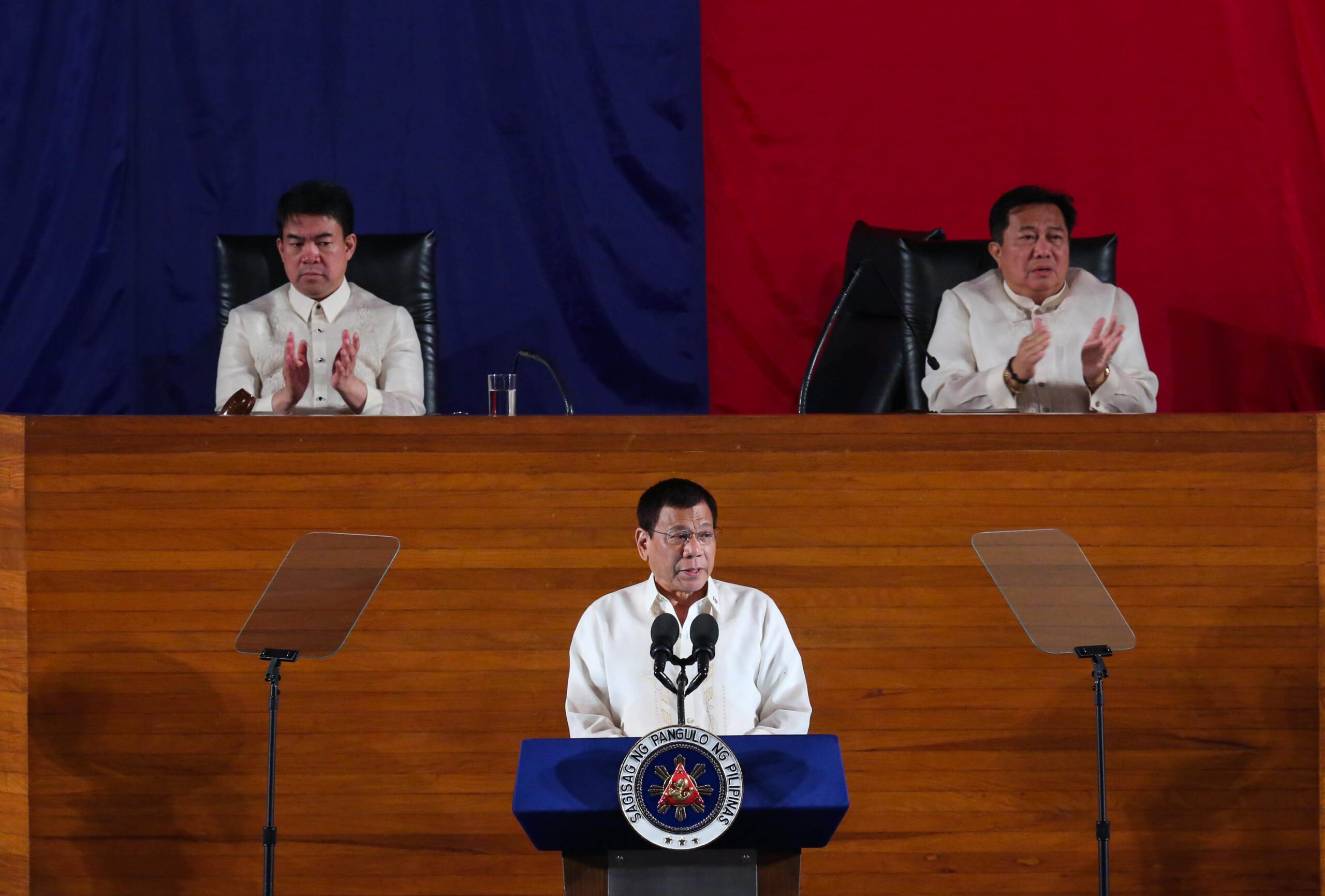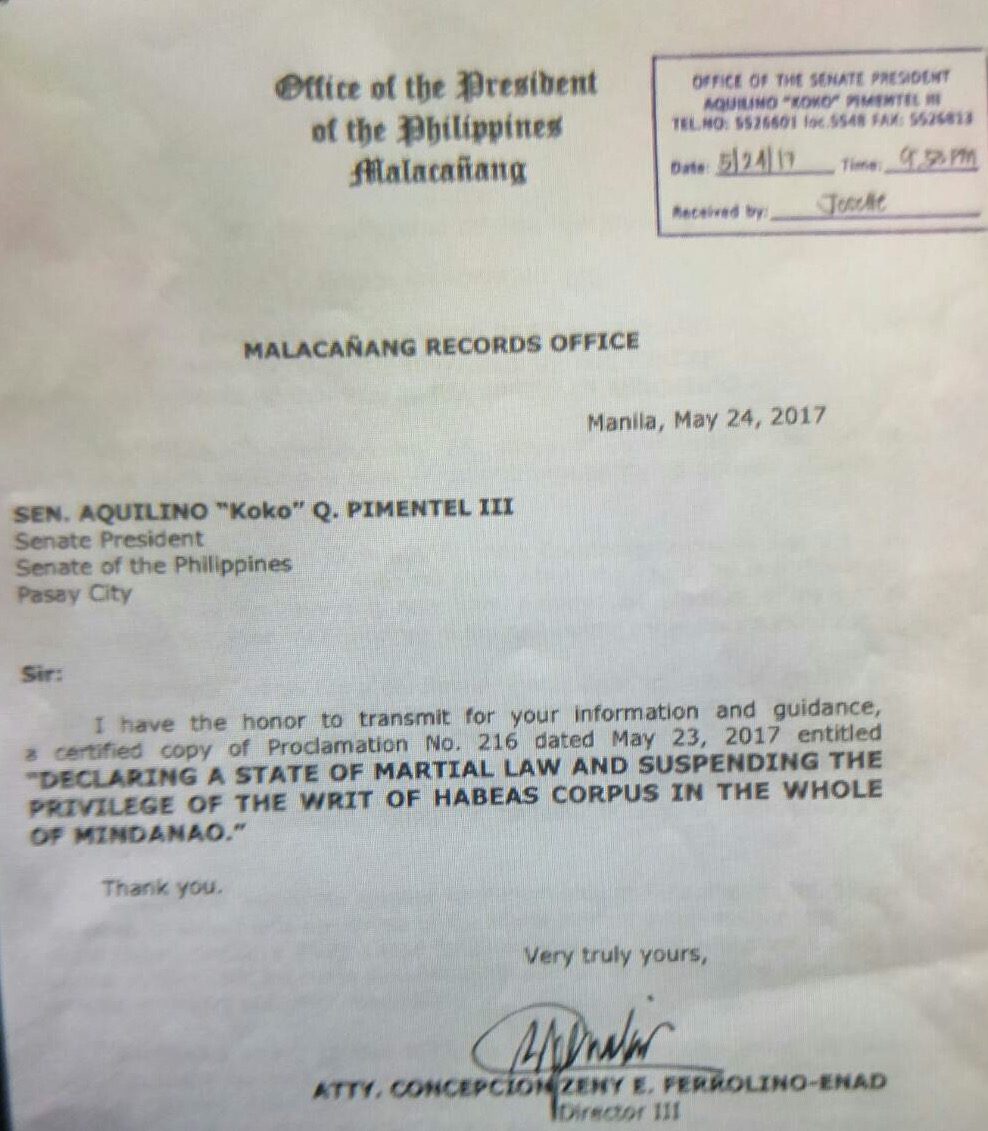SUMMARY
This is AI generated summarization, which may have errors. For context, always refer to the full article.

MANILA, Philippines – Congress, filled with President Rodrigo Duterte’s allies, has no intentions of revoking the Chief Executive’s declaration of martial law. (READ: Duterte says martial law due to ISIS threat)
That is according to Senate Majority Leader Vicente Sotto III, who added that Congress need not convene as they have no plans of junking the proclamation.
“We have no intentions of revoking, therefore we need not meet jointly. Wala akong alam (I am not aware) of any intentions to revoke,” Sotto said in a text message on Thursday, May 25.
Sotto said it was the same general sentiment during the senators’ caucus on Wednesday, May 24.
“Let the people monitor what’s happening and let the Department of National Defense and the Department of the Interior and Local Government and Philippine National Police do its work unhampered by people like us,” Sotto said, referring to discussions in the caucus.
Senate President Aquilino Pimentel III said he has not heard any objection so far.
“We have to determine the developing consensus although I haven’t heard of any objection yet,” Pimentel said in a text message.
Senate President Pro-Tempore Ralph Recto also said it is “highly unlikely” for Congress to revoke the martial law declaration.
“Highly unlikely for Congress to revoke proclamation. But we are waiting for the President’s report to Congress. The report will be basis for any action to be taken,” Recto said in a text message.
So far, only minority Senator Antonio Trillanes IV has openly opposed the proclamation, as he warned Duterte wants to put the entire Philippines under martial law next. (READ: Duterte eyes expanding martial law to whole PH)
Majority Leader and Ilocos Norte Representative Rodolfo Fariñas refused to say outright if the House of Representatives, filled with Duterte allies, will not revoke it.
“I do not want to preempt the meeting of the committee of the whole House. The 24 senators had their meeting already; we have not! Only the Speaker could make such a categorical statement at this time,” Fariñas said in a text message to Rappler.
He added Congress has to act only if it would revoke the declaration. Otherwise, if there are no qualms, martial law will continue to be in effect.
“The Congress has to act only if it shall revoke such proclamation. If it is in favor of the proclamation, it does not have to act, but nothing prevents either or both Houses from expressing support,” Fariñas told reporters.
The 1987 Constitution requires the President to submit a report within 48 hours of declaration to Congress, which has the power to either revoke or extend it through joint voting.
Malacañang transmitted Proclamation No. 216 to Congress late Wednesday night. But Pimentel said this is still different from the “report” mandated to be submitted to Congress.

“No. [The] report should contain the ‘basis or ground/s’ of the martial law declaration,” Pimentel said.
Duterte declared martial law in Mindanao on Tuesday, May 23, following the clashes in Marawi City, saying the declaration might last from over a month to a year. He also said it would be similar to military rule under the late dictator Ferdinand Marcos, which was marred by corruption and human rights violations.
The 1987 Constitution, however, says the imposition of martial law should not exceed 60 days, and that any extension has to be approved by Congress.
The President also said he might declare martial law in the entire country if the threat of the Islamic State (ISIS) persists.
Crafted after the EDSA People Power Revolution that ousted Marcos in 1986, the 1987 Constitution highlights the role of other branches of government in the martial law declaration. The provisions are meant precisely to prevent grave abuse and stop another Marcos from tinkering with civil rights.
Duterte is the 3rd Philippine president to declare martial law since 1972, after Marcos and Gloria Macapagal-Arroyo, who declared martial law in Maguindanao in 2009 after the Maguindanao massacre. – with reports from Mara Cepeda / Rappler.com
Add a comment
How does this make you feel?
There are no comments yet. Add your comment to start the conversation.